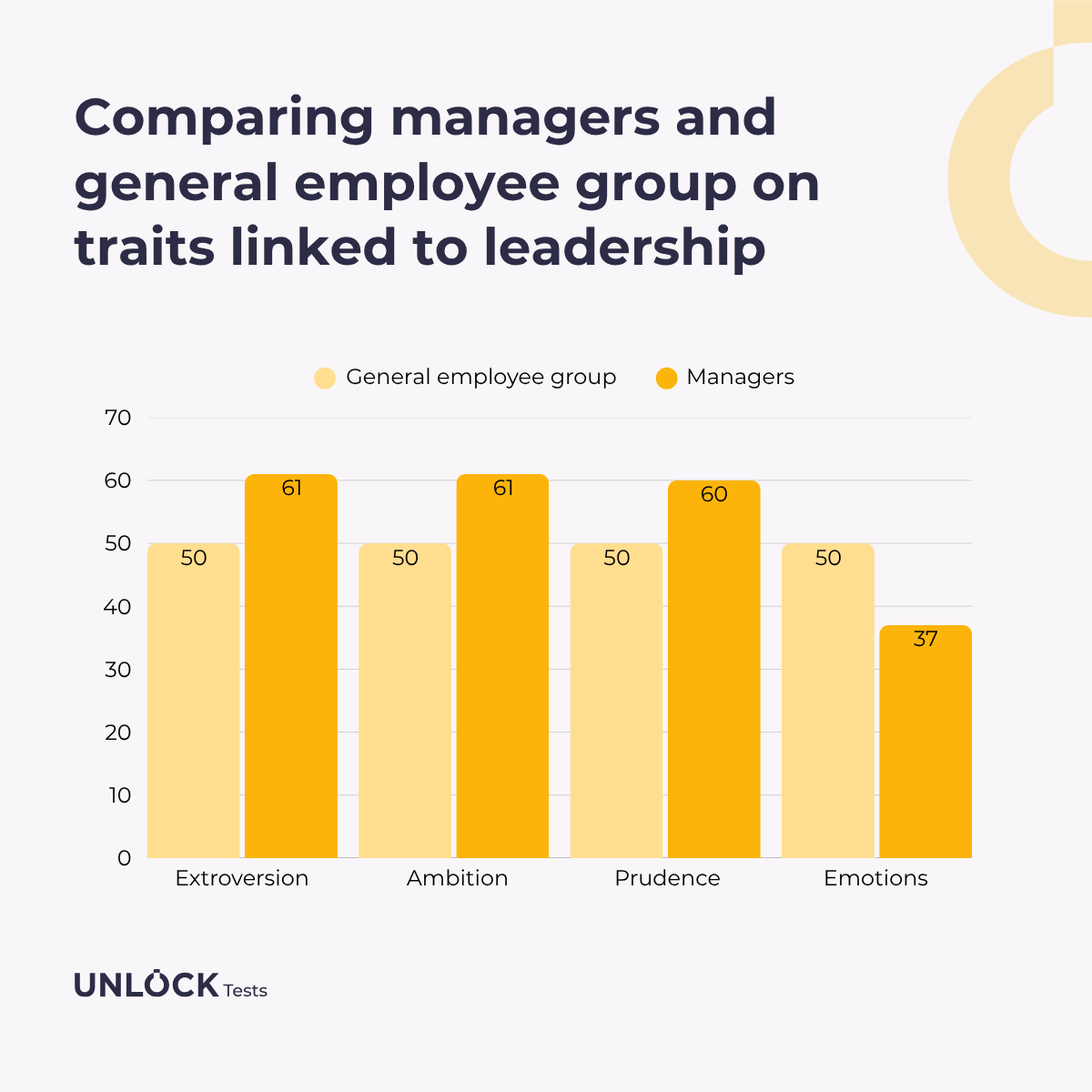Not all high-performing employees are ready to lead – but the right traits often show up early. Research shows that a person’s natural behavior patterns, as revealed through a well-designed personality test, can indicate potential for future management roles. By understanding the personality traits commonly seen in effective managers, HR teams and decision-makers can make smarter, more data-driven promotion choices. In this article, we share key insights from UNLOCK Personality test findings.
UNLOCK Personality statistic findings
Comparing managers and general employee group on traits linked to leadership.

Based on the data from the UNLOCK Personality assessment, we analysed the personality profile of 1267 managers working in Lithuanian organizations and compared their results to a general employee sample of 5,264 individuals from Lithuania. The discussed differences are statistically significant and supported by small-to-moderate effect sizes (d = 0.27–0.51). These findings highlight key personality patterns that are more commonly seen in individuals working in leadership roles. It’s important to note that these findings describe general trends observed in the group, not to define any individual. Still, personality insights like these can offer meaningful clues for identifying leadership potential, supporting development conversations, and recognizing individuals who may already be demonstrating the traits commonly seen in effective leaders.
Personality trait – extroversion
Managers in our sample scored 11 percentile points higher on Extraversion than our general employee sample – especially on traits linked to confidence, assertiveness, and optimism. In particular, leaders in our data stood out in Social Self–Esteem (seeing themselves as likeable and capable), Social Boldness (willingness to take the lead and speak in front of others), and Enthusiasm (expressing energy and optimism).
While not all managers are classic extroverts, our personality test data indicates that those in leadership roles are more likely to be energized by social interaction, comfortable in visible roles, and proactive in team communication. These traits support a leadership style that engages others, communicates clearly, and helps maintain energy within the team.
How to notice Extroversion in future managers?
- They speak with confidence and clarity, especially when presenting ideas or giving feedback in group settings.
- They naturally take the lead in meetings or discussions.
- They bring visible energy and optimism to the group, especially during challenges, when others feel stuck or demotivated.
- They are comfortable acting as the face of the team, presenting to senior leaders, clients, or stakeholders.
Two of the Organization factors’ facets – Ambition and Prudence – were noticeably higher among managers compared to the general employee group. Organization, as a broader personality dimension, reflects a person’s tendency toward planning, order, discipline, and goal orientation.
Personality trait – ambition
On average, managers scored 11 percentile points higher on Ambition compared to our general employee sample. This trait reflects the drive to set and pursue meaningful goals, often with a high level of personal investment.
In leadership roles, high Ambition manifests as a strong results orientation. Ambitious managers often set high standards both for themselves and for their teams, and show resilience in the face of obstacles. They may be more willing to take on challenging projects and push through when faced with setbacks.
How to notice Ambition in future managers?
- They actively seek out complex assignments or responsibilities, especially those that offer room to grow or make an impact.
- Push themselves to meet high standards, sometimes showing perfectionistic tendencies.
- Set their own performance goals beyond what is formally expected.
- Willing to put in extra effort – especially when outcomes matter to their career goals.
- Stay committed to the goal, even when a project slows down or challenges arise.
Personality trait – prudence
Managers scored 10 percentile points higher on Prudence compared to the general employee group. This trait reflects a person’s tendency to think actions through carefully, follow plans, and evaluate consequences before acting. While many employees are capable of planning and adapting when needed, those who score high on Prudence are more likely to rely on well–thought–out strategies, stay consistent, and approach tasks methodically.
In managerial roles, this results in a structured and disciplined work style. These individuals are typically reliable decision–makers who prefer to avoid rushed or impulsive actions. They are able to anticipate outcomes, follow through on commitments, and stick to plans. This kind of consistency helps build trust and stability – ensuring that projects stay on track and that expectations are met.
How to notice Prudence in future managers?
- They show up to meetings well-prepared, ready with ideas or suggestions.
- Make decisions carefully, taking time to weigh the options before moving forward.
- Once a plan is agreed on, they tend to follow it through carefully, are unlikely to change direction without a clear reason.
- They take responsibility for making sure plans are carried out
- Keep projects moving by reminding the team of deadlines, next steps, or what was agreed in earlier meetings.
Personality trait – emotions (Higher Emotional Stability)
Managers in our sample scored 13 percentile points lower on the Emotions factor, indicating greater emotional stability compared to our general employee sample. While their individual facet scores – such as sensitivity, caution, or tension – were largely average, the overall pattern suggests that managers tend to be better equipped to handle stress, remain composed under pressure, and maintain emotional control in demanding situations.
In leadership roles, this kind of emotional steadiness is often essential. It helps managers make reasonable decisions even in high–stakes or ambiguous environments, remain calm during conflict, and support their teams without being overwhelmed by their own emotional responses. Their ability to stay grounded and resilient can help create a sense of stability and trust within the team.
How to notice Emotional Stability in future managers?
- In stressful situations, they stay composed and offer practical solutions.
- Handle tough feedback without getting defensive or shutting down.
- Even when faced with uncertainty, they remain focused on what can be done next without seeming overly frustrated.
- When tensions or conflicts rise in the team, they help defuse conflict by listening without overacting and steering the conversation back to solutions.
Personality trait – leadership emergence and effectiveness
Our findings reflect patterns seen across global research on leadership. A recent large-scale meta-analysis by Javalagi, Newman, and Li (2024)* reviewed 223 studies on leader personality traits, effectiveness and emergence, representing tens of thousands of participants globally. The study found that certain personality traits consistently distinguish leaders from non-leaders.
Leadership emergence refers to how individuals come to be recognized as leaders by others, even without a formal title. In many studies, this is measured in group settings without an assigned leader – such as leaderless group discussions – where observers or peers identify who naturally takes initiative, influences others, or guides group decisions.
The traits most strongly linked to both emerging as a leader and being effective in a leadership role were:
- Extroversion – social confidence, energy, and assertiveness;
- Conscientiousness – goal orientation, reliability, and persistence;
- Emotional Stability – the ability to stay calm and consistent under pressure.
These research findings align closely with our own data. In our manager sample, we observed:
- Higher Extroversion, particularly in social self-esteem and optimism;
- Elevated Ambition and Prudence, which reflect the goal-driven and disciplined facets of what broader research labels Conscientiousness;
- Lower scores on the Emotions factor, indicating stronger emotional control and resilience.
Together, the broader literature and our own data point to a consistent conclusion: while leadership can take many forms, individuals who combine social confidence, emotional steadiness, and a goal-driven thoughtful approach to work are more likely to both emerge as leaders and succeed in leadership roles.
*Javalagi, A. A., Newman, D. A., & Li, M. (2024). Personality and leadership: Meta-analytic review of cross-cultural moderation, behavioral mediation, and honesty-humility.Journal of Applied Psychology, 109(9), 1489–1511. https://doi.org/10.1037/apl0001182
Related articles
UNLOCK Tests platform for your business
